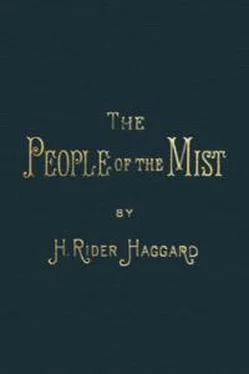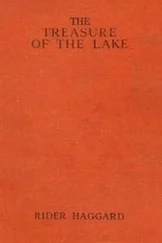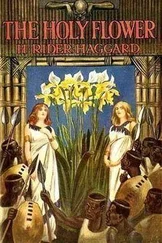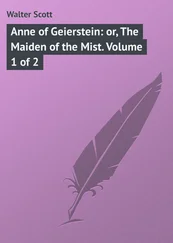"Mr. Turner is within, sir," answered a clerk of venerable appearance. "Mr. Thomson"—here his glance fell upon Otter and suddenly he froze up, then added with a jerk—"has been dead a hundred years! Thomson, sir," he explained, recovering his dignity, but with his eyes still fixed on Otter, "was the founder of this firm; he died in the time of George III. That is his picture over the door—the person with a harelip and a snuffbox."
"Indeed!" said Leonard. "As Mr. Thomson is not available, perhaps you will tell Mr. Turner that a gentleman would like to speak to him."
"Certainly, sir," said the old clerk, still staring fixedly at Otter, whose aspect appeared to fascinate him as much as that worthy had been fascinated by the eyes of the Water–Dweller. "Have you an appointment, sir?"
"No," answered Leonard. "Tell him that it is in reference to an advertisement which his firm inserted in the 'Times' some months ago."
The clerk started, wondering if this could be the missing Mr. Outram. That much–sought–for individual was understood to have resided in Africa, which is the home of dwarfs and other oddities. Once more he stared at Otter and vanished through a swing door.
Presently he returned. "Mr. Turner will see you, sir, if you and the lady will please to step in. Does this—gentleman—wish to accompany you?"
"No," said Leonard, "he can stop here."
Thereupon the clerk handed Otter a tall stool, on which the dwarf perched himself disconsolately. Then he opened the swing door and ushered Leonard and his wife into Mr. Turner's private room.
"Whom have I the pleasure of addressing?" said a bland, stout gentleman, rising from before a table strewn with papers. "Pray be seated, madam."
Leonard drew from his pocket a copy of the weekly "Times" and handed it to him, saying:
"I understand that you inserted this advertisement."
"Certainly we did," answered the lawyer after glancing at it. "Do you bring me any news of Mr. Leonard Outram?"
"Yes, I do. I am he, and this lady is my wife."
The lawyer bowed politely. "This is most fortunate," he said; "we had almost given up hope—but, of course, some proofs of identity will be required."
"I think that they can be furnished to your satisfaction," answered Leonard briefly. "Meanwhile, for the sake of argument, perhaps you will assume that I am the person whom I state myself to be, and inform me to what this advertisement refers."
"Certainly," answered the lawyer, "there can be no harm in that. Sir Thomas Outram, the late baronet, as you are doubtless aware, had two sons, Thomas and Leonard. Leonard, the second son, as a young man was engaged to, or rather had some love entanglement with, a lady—really I forget her maiden name, but perhaps you can inform me of it―"
"Do you happen to mean Miss Jane Beach?" said Leonard quietly.
At this point Juanna turned in her chair and became extraordinarily, indeed almost fiercely, interested in the conversation.
"Quite so; Beach was the name. You must excuse my forgetfulness. Well, Sir Thomas's affairs fell into confusion, and after their father's death Mr. Leonard Outram, with his elder brother Thomas, emigrated to South Africa. In that same year Miss Jane—eh—Beach married a client of ours, Mr. Cohen, whose father had purchased the estate of Outram from the trustees in bankruptcy."
"Indeed!" said Leonard.
"Shortly afterwards," went on the lawyer, "Mr. Cohen, or rather Sir Jonas Cohen, succeeded to the estate on the death of his father. Two years ago he died leaving all his property, real and personal, to his only child, a daughter named Jane, with reversion to his widow in fee simple. Within a month of his death the child Jane died also, and nine months later her mother, Lady Cohen, nee Jane Beach, followed her to the grave."
"Yes," said Leonard in a dull voice, and hiding his face in his hand; "go on, sir."
"Lady Cohen made a somewhat peculiar will. Under the terms of that will she bequeaths the mansion house and estates of Outram, together with most of her personal property, amounting in all to something over a hundred thousand pounds, to her old friend Leonard Outram and the heirs of his body, with reversion to her brother. This will has not been disputed; therefore, if you are Leonard Outram, I may congratulate you upon being once more the owner of your ancestral estate and a considerable fortune in cash."
For a while Leonard was too agitated to speak.
"I will prove to you," he said at last, "that I am this person, that is, I will prove it prima facie ; afterwards you can satisfy yourself of the truth of my statements by the usual methods." And he proceeded to adduce a variety of evidence as to his identity which need not be set out here. The lawyer listened in silence, taking a note from time to time.
"I think," he said when Leonard had finished, "that, subject to those inquiries of which you yourself have pointed out the necessity in so grave a matter, I may accept it as proved that you are none other than Mr. Leonard Outram, or rather," he added, correcting himself, "if, as I understand, your elder brother Thomas is dead, than Sir Leonard Outram. Indeed you have so entirely convinced me that this is the case, that I have no hesitation in placing in your hands a letter addressed to you by the late Lady Cohen, and deposited with me together with the executed will; though, when you have read it, I shall request you to leave that letter with me for the present.
"By the way, it may interest you to learn," Mr. Turner added, as he went to a safe built into the wall and unlocked its iron door, "that we have been hunting for you for a year or more. We even sent a man to South Africa, and he tracked you to a spot in some mountains somewhere north of Delagoa Bay, where it was reported that you, with your brother Thomas and two friends, were digging for gold. He reached the spot on the night of the ninth of May last year."
"The very day that I left it," broke in Leonard.
"And found the site of your camp and three graves. At first our representative thought that you were all dead, but afterwards he fell in with a native who appears to have deserted from your service, and who told him that one of the brothers was dying when he left the camp, but one was still in good health, though he did not know where he had gone."
"My brother Thomas died on the first of May—this day year," said Leonard.
"After that all trace of you was lost, but I still kept on advertising, for missing people have a wonderful way of turning up to claim fortunes, and you see the result. Here is the letter, Sir Leonard."
Leonard took the document and looked at it, while strange feelings crowded into his mind. This was the first letter that he had ever received from Jane Beach; also it was the last that he ever could receive.
"Before I open this, Mr. Turner," he said, "for my own satisfaction I may as well ask you to compare the handwriting of the address with another specimen of it that chances to be in my possession"; and producing the worn prayer–book from his pocket—Jane's parting gift—he opened it at the fly–leaf, and pointed out the inscription to the lawyer, placing the envelope beside it.
Mr. Turner took a reading–glass and examined first one writing and then the other.
"These words appear to have been written by the same hand," he said presently. "Lady Cohen's writing was peculiar, and it is difficult to be mistaken on the point, though I am no expert. To free you from responsibility, with your consent I myself will open this letter," and he slit the envelope at the top with an ivory paper–knife, and, drawing out its contents, he handed them to Leonard. They ran thus:
"My dearest Leonard,—For so I, who am no longer a wife, may call you without shame, seeing that you are in truth the dearest to my heart, whether you be still living, or dead like my husband and my child.
Читать дальше












